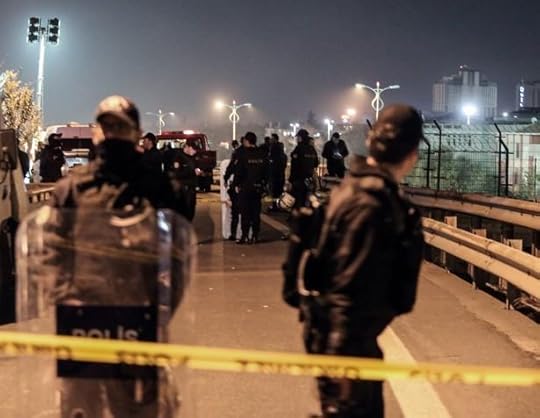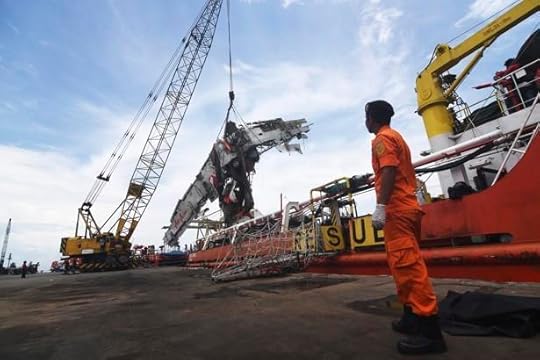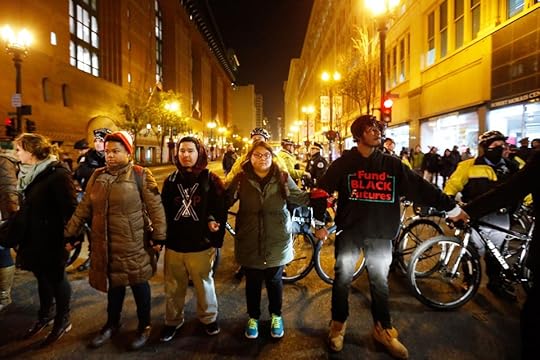Atlantic Monthly Contributors's Blog, page 285
December 1, 2015
A $45 Billion Birth Announcement

Mark Zuckerberg and Priscilla Chan announced the birth of their daughter Max on Tuesday in a long and heartfelt note on Facebook. The birth announcement was accompanied by something that quickly eclipsed news of their bundle of joy: A pledge to give away the majority of their fortune to a charitable initiative that will focus on “personalized learning, curing disease, connecting people and building strong communities.”
We will give 99% of our Facebook shares -- currently about $45 billion -- during our lives to advance this mission. We know this is a small contribution compared to all the resources and talents of those already working on these issues. But we want to do what we can, working alongside many others.
The announcement was immediately hailed for its generosity. The Zuckerbergs said the money will channeled throughout the couple’s lifetimes through the Chan Zuckerberg Initiative. The couple had previously signed The Giving Pledge, first conceived by Bill and Melinda Gates, Warren Buffett, and others, which committed several ultra-wealthy donors to give away their fortunes.
Nevertheless, the magnitude of Tuesday’s announcement was stunning. As Politico’s Alex Weprin pointed out, the announcement required a filing with the U.S. Security and Exchanges Commission.









A $305 Billion Highway Deal in Congress

For most of the last 10 years, the Highway Trust Fund has been a government account constantly on the brink of depletion. In the next several days, however, Congress is likely to replenish it for the rest of the decade.
House and Senate negotiators on Tuesday announced a bipartisan agreement on a five-year reauthorization of federal transportation programs—the longest such measure that Congress has advanced since 2005. Both chambers are expected to pass the deal in the next two weeks before leaving for the year.
At a cost of $305 billion, the final compromise is a bit smaller than a $340 billion bill passed by the House last month. The Senate had previously approved its own proposal that lasted for six years but only paid for three of them. To resolve the differences, the negotiators shortened the length of the bill by a year but made sure it did not add significantly to the deficit. Because Congress was unwilling to increase the gas tax or find another revenue source to sustain transportation funding into the future, lawmakers turned to measures that conservatives and fiscal hawks view as gimmicks. Advocates for higher infrastructure spending say a new revenue source—likely a tax increase of some sort—is needed to fully update the nation’s roads, bridges, and rails. A proposal released Monday by Hillary Clinton would nearly double what Congress is planning to spend.
Yet state and local governments, along with business groups like the Chamber of Commerce, will just be happy to have this initial infusion and the long-term certainty of federal funding for the next five years. They had long complained that the fits-and-starts nature of infrastructure funding in recent years had restricted their ability to plan big projects and limited economic growth. Beyond roads and bridges, the measure also funds public transit, freight rail, and transportation safety programs. “This legislation is a vital investment in our country,” the congressional negotiators said in a joint statement.
A safe, efficient surface transportation network is fundamentally necessary to our quality of life and our economy, and this conference report provides long-term certainty for states and local governments, and good reforms and improvements to the programs that sustain our roads, bridges, transit, and passenger rail system.
The highway bill is one of three major pieces of legislation that could pass Congress in the next few weeks. The House and Senate are expected to soon approve a bipartisan overhaul of the No Child Left Behind law, and the two chambers must pass a large spending bill to fund the government and avert a government shutdown.
Passage of the highway bill will also deliver a victory for advocates of the Export-Import Bank, the 80-year-old federal lending agency revived in the legislation. Conservative critics of the program had scored an initial win when Congress allowed the bank’s charter to expire over the summer, but it did not last long.
Supporters of a program that provides health benefits to ailing 9/11 first responders were not so lucky. The World Trade Center Health Program expired two months ago, and New York lawmakers had hoped to attach its renewal to the highway bill. They will now look to extend it when Congress considers another must-pass bill this month to fund the government after December 11.









Is AirBnB a Credible Champion on Income Inequality?

In recent weeks, we’ve learned AirBnB has forged a number of transcontinental love connections and afforded at least one indecisive couple a way to spend a year traipsing between different New York City neighborhoods on a paltry budget of $3,000 a month.
The popular home-rental site is not interested in these heroics. In recent months, the less whimsical aspects of the business have drawn ire in America’s largest housing market, New York City, where the company has been blamed for exacerbating an affordable-housing crisis.
AirBnB’s retort goes something like this: If you can’t make it here, there’s always AirBnB. Earlier this year, the company said that 87 percent of AirBnB landlords in New York are ordinary people who rent out their own homes “to pay their bills and stay in their homes.”
As the company continues to battle regulators and tries to rent a little space in the public’s heart, it released data on Tuesday to show how people use the site in New York City.
“Some 93 percent of revenue earned by active hosts in New York City comes from those who share their entire home and only have one or two rental listings on the platform,” The New York Times reported. “The typical annual host income is roughly $5,110, according to the data.”
This bid for transparency is meant to appease AirBnB’s opponents as well as combat the perception that it enables illegal hotels and limits affordable housing. Also, last year, New York State Attorney General Eric Schneiderman issued a report estimating that 72 percent of listings themselves are illegal.
While the numbers seem to reinforce the idea that most people who use AirBnB are just trying to get by, they also point to larger issue at the heart of the housing crisis: income inequality. A giant global tech company, which was recently valued at $24 billion, may not be the best champion for that cause.









What We Know About the Istanbul Explosion

An explosion near a central train station in Istanbul on Tuesday injured at least one person and raised fears in a city already on edge following recent bombings in Turkey.
Details are still unclear about the blast, but here’s what we know about the explosion:
—Vasip Şahin, Istanbul’s governor, said one person was injured in the blast near the central Bayrampaşa metro station. He said the cause of the explosion was unknown.
—Atilla Aydiner, the mayor of Bayrampasa district, where the blast occurred, told A Haber TV five people were injured in the explosion, which he attributed to a pipe bomb.
—The privately owned Doğan news agency reported that the blast was caused by a homemade cluster bomb. Other reports said the explosion was caused by a power transformer.
This story is developing and we’ll update it when we learn more.









Suffering for Art (and Oscars)

Stories of Leonardo DiCaprio’s resilience on the set of The Revenant, the upcoming biopic of the frontiersman Hugh Glass, have buzzed around Hollywood for months as Oscar season approaches. “I was sleeping in animal carcasses,” the actor told Yahoo. Crew members told the The Hollywood Reporter that the shoot was “a living hell.” On Tuesday, the hype reached apocryphal levels with the Drudge Report headline, “DICAPRIO RAPED BY BEAR IN FOX MOVIE.” Attached to all of this hoopla is a more curious question: whether all the physical pain DiCaprio endured will help him finally win his first Oscar.
Related Story
It's Been 15 Years Since Leonardo DiCaprio Took a Risk on a Movie
It might. Since The Revenant started screening for critics and the industry in November, DiCaprio has emerged as the compelling favorite to win the Best Actor Academy Award for his performance. But most of the reasons seem to be separate from the quality of the movie itself. DiCaprio, one of Hollywood’s biggest and most consistent stars, is a five-time Oscar nominee with a storied career, which means he’s seen as being “overdue” for a trophy. And The Revenant, which follows a 1820s fur trapper as he seeks revenge on the men who abandoned him in the wilderness after a devastating bear attack, was reportedly so demanding to shoot that DiCaprio can qualify for a whole new category: endurance acting, the macho, Method heroics that so often speak to Oscar voters.
The Oscars are, after all, as much about the stories behind the scenes as they are about the films they honor. Sometimes it’s the career win, like Al Pacino in Scent of a Woman, or Kate Winslet in The Reader; such trophies are partially awarded as recognition of an actor’s previous snubs. But more often, voters are won over by tales of commitment on set: Daniel Day-Lewis spending the whole shoot of My Left Foot in a wheelchair, Robert De Niro gaining a scary amount of weight for Raging Bull, Matthew McConaughey losing just as much weight for Dallas Buyers Club. Such devotion to their craft is surely worth recognition. Right?
A similar phenomenon exists in the Lead Actress race, but it’s tied more closely to physical appearance. Voters have long been impressed by the “bravery” of famously beautiful women being willing to appear dowdy or unattractive in a role (known as “deglam” work in Oscar circles). When Nicole Kidman won for playing Virginia Woolf in The Hours, Denzel Washington noted her prominent makeup job in the film by joking that she had won “by a nose.” Charlize Theron donned an entirely new face to play the serial killer Aileen Wuornos in Monster. These were great performances, but the media narratives around them during awards season seemed focused on the physical transformations at play.
The Revenant is pitching itself to voters as a heroic sacrifice at the altar of cinema.In DiCaprio’s case, the stories of his on-set trauma are already legend. His feats on The Revenant set include battling hypothermia and getting flung around in the snow by cables during a simulation of the crucial bear attack. Despite The Drudge Report’s claims, there’s reportedly no animal-on-man sexual assault in the film, but that hysteria confirms the consensus that the film is a grueling experience—both for its actor, and for audiences. The film blogger Jeff Wells praised it for being so gritty that it could only be stomached by male viewers—“Forget women seeing this,” he wrote. He later clarified that he was moved to this opinion by the sight of a female friend covering her eyes as she watched the film, but the implication was clear: The Revenant is the ultimate in macho filmmaking, and voters should be impressed by that fact alone.
That probably wasn’t DiCaprio’s intention in making the film, or the reason the director Alejandro González Iñárritu has discussed the fraught process of shooting it. Wells and his ilk certainly aren’t the only audience they’re interested in. But awards publicity campaigns often settle into an easy narrative, and before the public has even seen the film, The Revenant is pitching itself to voters as a heroic sacrifice at the altar of cinema. Most Oscar winners have a big “clip” they can focus their campaign on—a powerful speech, or an emotional breakdown—but DiCaprio is largely silent in the film as he forges his way through the snow. And if that effort is enough to impress viewers, he could very well find himself on the Oscars stage in February.









The Most 2015 Song of 2015

Today Spotify revealed that the most streamed song of 2015 is Major Lazer’s “Lean On,” featuring MØ and DJ Snake. With 540 million listens, it’s also the most streamed song of all time, a distinction that speaks to the newness of streaming itself. Next year, there may well be a new most-streamed song of all time. Or a few of them.
But there won’t be another “Lean On.” The Spotify data makes official that this is the 2015-est song of 2015, a bizarre little creation that would have sounded avant garde as of just a few years ago but now feels like collection of sounds on the cusp of tipping from trendy to tired. I bobbed my head a lot to “Lean On” this year; a big part of me hopes to never hear it again.
Let’s count the ways it’s current:
There’s the fact of who Major Lazer is: a collaboration led by Diplo, the producer whose raiding of dance-music styles from around the world over the past decade has helped shape the sound of EDM and pop. This year, he produced the best songs on Madonna’s Rebel Heart , and his work with Skrillex, under the name Jack Ü, resulted in Justin Bieber’s huge comeback single “Where Are Ü Now.” Talking about the creation of that Bieber song, Diplo said that his mentality as a producer is to find ways to use the same technology as everyone else in different ways. Which means creatively warping sounds so as to be unrecognizable, new. “Lean On” is a lot like “Where Are Ü Now” in its pairing of sensitive, humane voice with a cavernous, almost alien soundscape, including the use of a few purely wordless hooks you’d call “instrumental” if you could identify any of the instruments. The main wordless hook for “Lean On”—the one that comes after the big chorus vocals—comes courtesy of DJ Snake, the trap and EDM producer whose hit “Turn Down for What” plausibly could have been called the 2014-est song of 2014. The high, whining sound (possibly a manipulated sample of MØ herself) and skittering drums he uses are a lot like the raucous breakdown in “Turn Down,” providing an all-important element of familiarity to the new song. Listen closely and you hear some background “heys,” another production tick of trap music that’s increasing common across pop music. The rest of the arrangement also has a “tropical house” feel, which is to say there are Caribbean music signifiers but filtered to feel as if it’s made on another planet’s islands. That same vibe can be heard all over other notable songs of 2015, from Bieber’s “Sorry” to the hit remix of OMI’s “Cheerleader.” Which means you can also throw in another very current musical phenomenon: cultural appropriation, something the globetrotting Diplo has never shied away from (his slogan—“random white dude be everywhere”). Perhaps not coincidentally, “Lean On” was hit with criticisms separate from the music, stemming from the fact that its video used South Asian locations and dancers. More than anything, though, the song’s now-ness comes from the vocals. The Danish musician MØ is part of a class of soundalike singers that includes hitmaking 2015 newcomers like Halsey, Zara Larsson, Alessia Cara, Bebe Rexha, and their more famous recent influences: Sia, Ellie Goulding, Lana Del Rey, Lorde. Buzzfeed’s Reggie Ugwu recently investigated the trend, and pegged its defining trait as the linguistic phenomenon of “vowel breaking.” I’m not sure that MØ’s performance on “Lean On” offers a perfect example of it, though certainly the way she says “blow a kills” as “blocus” is pretty broken. Mostly, her scratchy-to-soaring, generally unintelligible delivery reminds me a lot of this viral Vine about the “indie girl” sound—a sound that’s not at all just used by indie artists these days.One more thing: How can it be that this is the most streamed song in the world and yet was only No. 4 on the Billboard charts? How can it be that some people called it the song of the summer while plenty of other folks may have never heard the name “Major Lazer” at all? The answer is that streaming, as important as it is, isn’t the same as the broader pop world. Fans of hip-hop and EDM are the most energetic users of services like Spotify; the playlist of Beats 1 radio that launched with Apple Music is full of songs that aren’t being played on terrestrial stations and feature one or more of the attributes listed above. In a year when the streaming wars really heated up, “Lean On” represented how the listening platforms of the future are still, to some extent, an alternative. That fact could well change in 2016, and so might the music that drives that change.









What Brought AirAsia Flight 8501 Down?

Indonesian investigators have determined what brought down the AirAsia passenger plane that crashed into the Java Sea nearly nearly a year ago, killing all 162 people on board.
Indonesia AirAsia Flight 8501 crashed as a result of technical failures and the crew’s response to them, according to a report published Tuesday by Indonesia’s National Transportation Safety Committee. Australia, France, Singapore, and Malaysia joined Indonesia in the months-long investigation.
Flight 8501 took off from Surabaya, Indonesia, on December 28, 2014, bound for Singapore. Just 42 minutes into the two-hour fight, the Airbus dropped off radar screens in Jakarta. Search crews located the wreckage in January, and recovered the plane’s black boxes, which contain flight data and audio from inside the cockpit.
According to the report, a system that controlled the movement of the aircraft’s rudder failed four times, sounding alarms that could be heard on the cockpit audio recording. Each time, the pilots reset the computer system that controls a range of airplane functions, including rudder movement, by turning it off and then on again. Operations resumed normally. The trouble began seconds later, when someone inside the cockpit attempted to reset the computer system again, this time by pulling out and then reinserting circuit breakers.
This reset led to an electrical interruption to the computer system, causing autopilot to disengage, according to the report. The aircraft ascended sharply by several thousand feet, and then stalled.
The lead pilot can be heard on the cockpit audio saying “level,” “pull down,” and “slowly” several times. The second pilot, a native of France, can be heard saying in French, “What is going wrong?”
The Airbus rolled to the left, and then began plummeting down at 20,000 feet per minute. No emergency message was transmitted by the crew before air-traffic controllers lost contact with the aircraft.
Investigators traced the failure of both the rudder and computer systems to a cracked solder joint inside circuit boards. The rudder system had experienced problems 23 times since January 2014, according to the airline’s maintenance records cited in the report.
Investigators did not cite human error as a contributing factor to the crash, but said “subsequent flight crew action leading to inability to control the aircraft … resulted in the aircraft departing from the normal flight envelope and entering prolonged stall condition that was beyond the capability of the flight crew to recover.”
The report said “the consequences of resetting [circuit breakers] in flight are not described in Airbus documents. It requires good understanding of the aircraft system to be aware of the consequences.”
Indonesia AirAsia Flight 8501 was flying through storm clouds at the time of the crash, but the report found that weather conditions did not affect the aircraft.
The plane was carrying 155 passengers and seven crew. All but seven of the victims were from Indonesia.
Indonesia AirAsia is a low-cost airline based in Tangerang. Between 2007 and 2010, the airline was banned from flying to the European Union due to safety reasons.









The Death of Juneau's Mayor

Updated on December 1 at 3:50 p.m. ET
On Monday evening, Stephen “Greg” Fisk was found dead at his home in Juneau. Weeks earlier, the 70-year-old fisherman had unseated Merrill Sanford to become the mayor of Alaska’s capital city.
Fisk was found by his son Ian, who arrived at the home after the mayor had failed to answer the phone. His death ignited shock and sadness throughout the city and the state.
My thoughts and prayers are with the family of Mayor Greg Fisk. He will be remembered for his dedicated service to the community of Juneau.
— Governor Bill Walker (@AkGovBillWalker) December 1, 2015
However, the suddenness of his death and its lack of a clear cause also initiated suspicions that Fisk had died an unnatural death.
“JPD is aware of rumors that an assault occurred in connection with Fisk’s death," the Juneau Police Department said in a statement on Monday night. “Those rumors are speculation. Detectives are actively investigating facts of the incident, and all evidence is being preserved and documented.”
Bryce Johnson, the city’s police chief, told the Juneau Empire suicide had been ruled out, and noted there had been no sign of forced entry. He added assault is “one of the possibilities out there, but there’s others that could have happened. There could’ve been a fall, there’s lots of things that would cause it.”
(Update: The Alaska Dispatch News reports that, according to investigators, Fisk’s body had sustained injuries when discovered by his son. A Juneau police spokeswoman wouldn’t describe the injuries, but said that they “could be characterized as signs of trauma.”) Little else will be known until an autopsy report comes back later this week.
“It's a devastating event,” said Deputy Mayor Mary Becker, who is now acting mayor. “He was a great person and he will be missed.”









The Firing of Chicago Police Chief Garry McCarthy

It took 14 months for Chicago authorities to release the videotape of an officer killing Laquan McDonald. But now that the footage is public, events have begun to move much faster.
Mayor Rahm Emanuel fired Police Superintendent Garry McCarthy overnight, the Chicago Sun-Times and Tribune reported. Emanuel announced the move Tuesday morning. The mayor had previously scheduled the press conference to announce the creation of a task force on police accountability.
McCarthy’s professional demise seemed pre-ordained by Tuesday. He was at the center of two raging controversies: First, of whether the police department acted improperly in investigating McDonald’s death, and second, about whether top city leaders delayed charging Officer Jason Van Dyke because of political considerations. At least one person was going to be fired, and McCarthy was first on the list.
Related Story
The Chicago Protests Aren't Just About Laquan McDonald
“Superintendent McCarthy knows that a police officer is only as effective as when he as the trust of those he serves,” Emanuel said. “After this weekend of effectively handling the protests of the release of McDonald videotape and the handling of Laquan’s killer, we talked about the fact that the trust of the police department has been eroded. This morning, I formally asked for his resignation.”
McCarthy’s firing comes as there is closer scrutiny of the handling not only of the dashcam of McDonald’s death, but also of footage from a nearby Burger King. Some 86 minutes are missing from the store’s security camera, including the crucial stretch where Van Dyke pulled up and fired 16 shots at McDonald. A Burger King district manager has said police spent hours at the restaurant, then deleted part of the tape. McCarthy blamed the gap on a technical glitch; State’s Attorney Anita Alvarez, who is prosecuting the case, said there was no tampering with the tape.
Outside of the specific questions about the investigation, there’s also a growing chorus—both within local media, which has been following the story closely for months, and in national media—asking why it took so long for the tape to be released and for charges to be brought against Van Dyke, who is the first on-duty Chicago officer to be charged with first-degree murder in decades. Bernard Harcourt laid out the critique in The New York Times Tuesday:
But the timing, in late 2014, was not good. Then up for re-election, the mayor of Chicago, Rahm Emanuel, was looking ahead to a contested election on Feb. 24, 2015, which would ultimately result in a runoff election on April 7. In Ferguson, Mo., a grand jury was hearing testimony on the police shooting of Michael Brown. The video of Eric Garner being choked to death during an arrest in New York had gone viral. The Black Lives Matter movement was gaining momentum across the country.
While there have been calls for McCarthy’s firing, there have also been demands for Emanuel and Alvarez to step down. Those calls echoed in Tuesday’s press conference, where one reporter basically accused Emanuel of using his police chief as a scapegoat. “What did Garry do wrong?” he asked. Others demanded to know what responsibility the mayor bore for not reforming the department earlier, or asked whether he would step down.
Emanuel rejected suggestions that politics interfered with the investigation.
“I have said for a long time that … upon the completion of the investigation, the video would be made public, and that is what happens four hours after the completion of that investigation,” he said—helpfully omitting the fact the release had been ordered by a federal judge, and that Alvarez said she brought the charges when she did to try to guarantee public safety after the release of the video.
Have you become a distraction, another reporter asked? “I’ll let you make that judgment,” the famously prickly Emanuel shrugged.
The mayor, who won his second term in April after an unexpectedly close runoff election, picked McCarthy as superintendent in 2011. McCarthy was chosen after a lauded tenure as chief in Newark, New Jersey, where he worked with Mayor Cory Booker and oversaw a reduction in crime rates. McCarthy did not have the same success in Chicago, where murder rates have surged, though Emanuel said Tuesday that McCarthy had taken important steps to drive down crime and should be proud of his service. McCarthy is also co-chair of a coalition of police leaders that called for criminal-justice reform in October.
McCarthy is not the first big-city police chief to fall after incidents of brutality. In July, Baltimore Mayor Stephanie Rawlings-Blake fired Commissioner Anthony Batts in the wake of Freddie Gray’s death and subsequent riots. Rawlings-Blake later announced she would not run for reelection. Emanuel, a Democrat who has had a tumultuous term in office following Mayor Richard Daley’s long reign, showed no sign Tuesday that he intended to follow Rawlings-Blake’s example. He said John Escalante, McCarty’s deputy, would take over the force on an interim basis while a search was conducted for a new chief.









November 30, 2015
A Rare, High-Level Handshake in Paris

Comoros’ President Ikililou Dhoinine inadvertently ended up in the middle of a big diplomatic moment on Monday when Israeli Prime Minister Benjamin Netanyahu and Palestinian Authority President Mahmoud Abbas were seen shaking hands for the first time at the opening of climate talks in Paris. It was the first time the two men had stood face-to-face in five years.
Anyone believing in the symbolic power of handshakes would be quickly disappointed by what happened next: Both men downplayed the encounter.
“It was purely protocol, not a working meeting,” Netanyahu told reporters when asked about the moment. Netanyahu added, “It’s important for the world to see that we’re always willing to talk. But, on the other hand, I have no illusions about Abu Mazen [Abbas].”
Abbas, for his part, used the conference’s opening as an opportunity to accuse Israel of a litany of crimes against Palestinians. “Our resources are being usurped, our trees are being uprooted, our agriculture is being destroyed,” Abbas said of Israel.
The gesture also came just hours after Netanyahu formally suspended contacts between Israeli and European Union that worked on the last round of peace talks. The decision, as the JTA reported, “comes in the wake of the EU decision to approve special labeling for Israeli products made in the West Bank and Golan Heights.”
Nearly 200 world leaders will spend two weeks in the French capital for the United Nations Climate Change Conference, an annual discussion of the need to reduce greenhouse-gas emissions.




[image error]




Atlantic Monthly Contributors's Blog
- Atlantic Monthly Contributors's profile
- 1 follower



